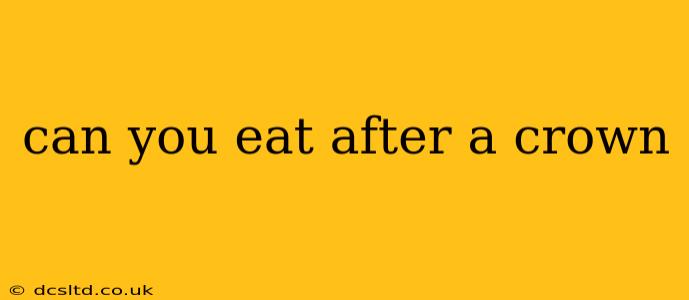Getting a dental crown is a significant step in restoring your oral health. Whether it's protecting a weakened tooth, improving its appearance, or completing a dental implant, the procedure itself involves careful preparation and placement. A common question following the procedure is: "Can I eat after a crown?" The answer, thankfully, is yes, but with important caveats. This guide will explore the specifics of eating after crown placement, offering guidance and addressing frequently asked questions.
What Happens After Crown Placement?
Immediately after your crown is cemented, your mouth will likely feel numb from the local anesthetic. This numbness will gradually wear off over several hours. During this time, avoid eating or drinking anything hot or excessively cold to prevent discomfort. Your dentist will provide specific post-operative instructions, which should be followed diligently. These instructions might include advice on pain management, oral hygiene, and dietary restrictions.
When Can I Eat After Getting a Crown?
You can typically begin eating a few hours after the numbness subsides, once you regain full feeling in your mouth. However, it's crucial to start with soft foods. The initial days are critical for the cement bonding the crown to the tooth to properly set. Rushing the process by consuming hard or chewy foods can dislodge the crown, requiring costly and time-consuming readjustment.
What Foods Can I Eat After Getting a Crown?
The key in the early days is to choose soft, easily chewed foods. Think:
- Soups: Broths, pureed soups.
- Yogurt: Smooth, non-chunky varieties.
- Applesauce: Smooth and without chunks.
- Mashed potatoes: Creamy and well-cooked.
- Scrambled eggs: Soft and easily digestible.
- Oatmeal: Cooked until soft.
- Soft cooked vegetables: Pureed or well-cooked vegetables like carrots or squash.
What Foods Should I Avoid After Getting a Crown?
For at least a week, avoid these foods:
- Hard candies: These can chip or crack the crown.
- Sticky foods: Caramels, taffy, and other sticky treats can pull the crown loose.
- Tough meats: Steaks, jerky, and other chewy meats require excessive chewing force.
- Nuts: Hard and can damage the crown.
- Ice: Avoid biting or chewing on ice as it can damage your new crown and the underlying tooth structure.
- Extremely hot or cold foods: While the numbness wears off, these can cause sensitivity and discomfort.
How Long Does It Take for the Crown to Fully Set?
While you can begin eating soft foods a few hours after the procedure, it takes several days, even a week, for the cement to fully set and for the crown to become securely bonded to the tooth. Be mindful of your diet during this entire period.
What if My Crown Feels Loose?
If your crown feels loose or you experience any pain or discomfort, contact your dentist immediately. Don't attempt to adjust it yourself. Prompt action can prevent further complications.
Can I Eat Anything I Want After a Week?
After a week, you can gradually reintroduce firmer foods into your diet. However, it's still wise to avoid excessively hard, sticky, or chewy items that could potentially damage your crown. A healthy balanced diet is always recommended for overall oral and general health.
What Happens if I Don't Follow Dietary Restrictions?
Failing to follow the dietary restrictions after getting a crown can lead to several negative consequences, including:
- Crown displacement: The crown could become loose or dislodged.
- Cement failure: The cement bonding the crown might not set properly.
- Tooth damage: The underlying tooth could be damaged.
- Increased sensitivity: The tooth might become more sensitive to temperature changes.
- Infection: In extreme cases, infection could occur around the crown.
Following your dentist's instructions carefully is vital for ensuring the longevity and success of your dental crown. By paying attention to your diet in the days and weeks following the procedure, you'll significantly improve the chances of a healthy, long-lasting restoration. Remember, your dentist is your best resource for personalized advice and support.
